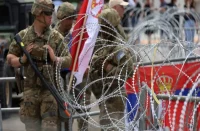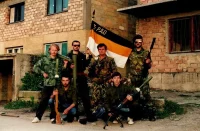The avalanche of comments in the wake of the twin terrorist attack in Europe’s exemplary Norway range from expressions of belief that the terrorist at the epicenter of the disaster must be insane and the possibility of recurrences of the situation can be safely discounted to claims that the plot is attributable to a powerful and hitherto undetected transnational network. What seems to fly below the radar in all cases is the importance of the fact that, according to Breivik’s own statement, his conversion to terrorism was triggered by the West’s involvement in the Balkan conflict to which Europe’s subsequent political shifts and identity dynamics can largely be traced.
Admittedly, the 1999 NATO aggression against Yugoslavia put the finishing touches on Breivik’s whole worldview. With a reference to the Serbs as “brothers”, Breivik slammed the US and West European countries for bombing them in response to what he described as attempts to deport Muslims to Albania. It should be realized that in this instance Breivik is advocating a rarely publicized but commonplace view: for many, the Balkan developments in the late 1990s marked the collapse of Europe’s post-World War II configuration as well as of the political and moral philosophies with which it used to be interwoven. By launching air raids against Yugoslavia and mixing up without restraint military and civilian targets, the Western coalition erased irreversibly the border between war and humanitarian mission. In the epoch, protection of national sovereignty was stamped as terrorism and genocide, arm-twisting in dealing with a relatively defenseless country became known as the negotiating process, and clearly terrorist groups saw themselves propelled to the status of freedom fighters.
US Balkan envoy R. Gelbard unequivocally branded the Kosovo Liberation Army a terrorist group in the early 1998, when the Kosovo conflict more or less remained under international control. The circumstance, however, did not prevent Washington from partnering the KLA. In March, 1999, the US Senate’s Republican Policy Committee released a report titled Kosovo Liberation Army: Does Clinton Policy Support Group with Terror, Drug Ties?, where it called into question the credentials of Washington’s new Balkan allies.
On the other hand, over the course of time Washington has built a lengthy list of partners turned foes. As of today, it includes – but is not limited to – Iraq’s S. Hussein, the Afghan Talibs, and Libya’s M. Gadhafi. Even the career path of number one terrorist Usama bin Laden began not with the 1998 terrorist attacks against US embassies in Kenya and Tanzania, but with the US-backed struggle against the Soviet forces in Afghanistan.
Of course, the West’s double standards and deeply immoral approach to international politics could not be the only factors behind Breivik’s evolution towards terrorism. Names of former Balkan residents appear frequently on Europe’s crime surveys, and, occasionally, under bizarre combinations of circumstances. Last March, a 21-year-old Albanian Arid Uka opened fire on US servicemen at the Frankfurt airport. Regardless of the US being the main pillar of Kosovo’s self-proclaimed independence, Uka said he was killing soldiers who were going to fight against Muslims in Afghanistan. Strange as it might seem, German prosecutors avoided charging Uka with terrorism on the grounds that, as the investigation showed, he acted alone and there were no indications of his connection to any terrorist group.
At the moment Norway’s police is saying roughly the same about Breivik. Head of Norway’s intelligence police Janne Kristiansen stressed recently in an interview to BBC that Breivik has not been part of any extremist network.
At the point we encounter the scariest aspect of today’s situation in Europe (along with quite a few other places). It is a normal job for police to hunt down organized terrorist groups, but watching over desolate and disconnected individuals whose mentality simply started to mirror the immoral and corrosive state of current geopolitics may prove a much tougher challenge.
Some year and a half ago the administrations in Belgium and several other European countries voiced concern over the tide of Albanian immigration, but the EU bureaucracy bluntly reiterated its commitment to the European integration and refused to retreat from the regime of visa-free entry for Albania or Bosnia and Herzegovina. The triumph in Finland of True Finns, a populist and nationalist party whose agenda evokes serial similarities with Breivik’s notorious manifesto, should also have rung a bell for Europe. In the meantime, loners in the state of mental Balkanization are moving to the front stage.
In 2014, Europe will be commemorating the outbreak of World War I, which was sparked by the Balkan conflict. Gavrilo Princip’s attack was at the time seen as an irrational act perpetrated by a marginal group, but from a wider perspective Europe was already programmed to become the scene of a conflict of giants – the Entente and the Triple Alliance. As a result, the shots fired by Princip became a prologue to a new epoch.
At the moment the Balkans, a region with open or brewing conflicts in Kosovo, Bosnia, Macedonia, etc., are psychologically prepared for a new war. It is not going to be one of these trade or currency wars, nor a war fought with informational warfare. Rather, it will be a real and bloody war fought by everybody against everybody else, with no classic division lines…
Source: Strategic Culture Foundation














Comments